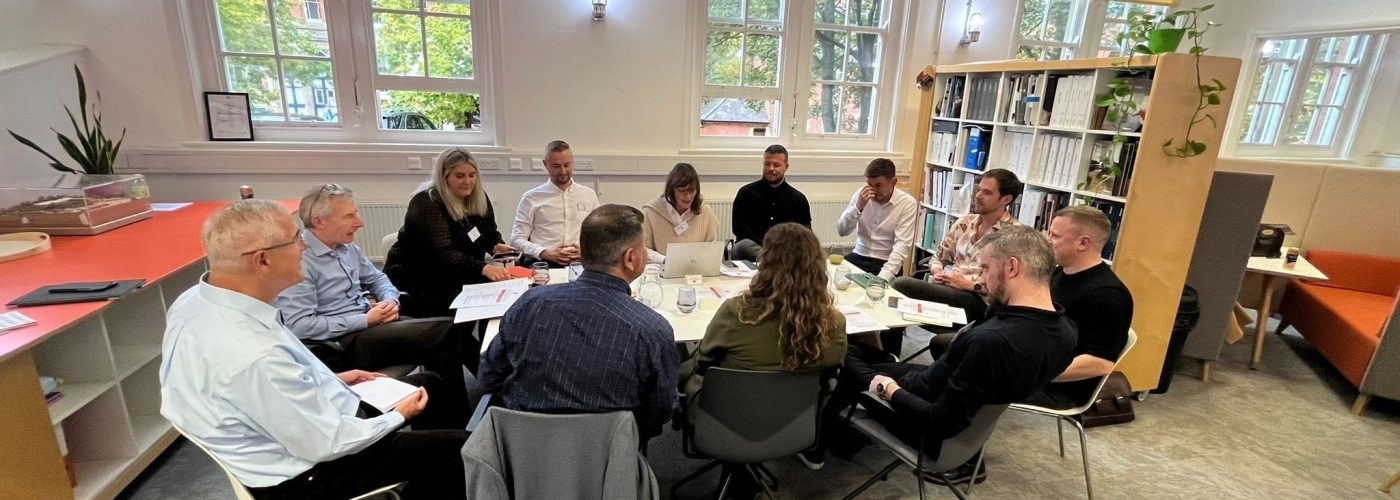THE POST-pandemic office needs to be people-centric with businesses creating the best environments for their teams to thrive, according to a panel of industry experts.
Speaking at a roundtable discussion hosted by GT3 Architects, the group discussed ways in which their organisations are creating a positive working environment for their teams, and how the increasing demand for high-calibre individuals is establishing a renewed need to look at how the workplace functions.
The panel agreed that flexibility and choice are key considerations for both current and prospective employees, as well as having a defined culture that is understood throughout all levels of the business.
Michael Simpson, associate director and workplace consultant at GT3 Architects, said: “We can’t rely on data from the pandemic as working from home was enforced, so we’re just now beginning to see trends emerge through our work with businesses looking at their office space.
“We’ve seen that people highly value flexibility, not just in terms of working from home versus the office, but also when and how they do that work. The strongest and clearest conclusion is that people want the choice – they don’t want to be told they can or can’t come in.”
One underrated benefit of working from the office discussed by the panel, was the so-called “osmosis effect”, where team members share knowledge and experience simply by being around each other and overhearing conversations.
Adam Tarleton, head of construction and procurement at Macildowie Recruitment, said: “Being in the office is particularly beneficial for more junior members of the team, but we’re seeing a lot of candidates that list being able to work largely or exclusively from home as their top priority.
“While there are benefits to this, I think it is maybe a little lost on them that you learn so much just from sitting near other people, absorbing how they interact with each other and simply gaining a better understanding how the business works.”
There was cross-panel consensus on the office being the best, and sometimes only, way to ensure effective collaboration and creative thinking, as working from home is often productive but also causes teams to work in silo.
James Garment, director at engineering consultancy Hexa, said: “There’s a bit of a fallacy that just because you’re working from home and ticking off everything on your to-do list, you’re being productive, but when you’re in the office having meetings and talking with the team, you’re not achieving as much as you would like.
“The reality is that those in-person meetings and conversations are every bit as valuable as completing everything off your task list, so it’s about that balance and understanding that the perception of “being productive” can be a little bit skewed by traditional thinking.”
The location of offices was also identified by the group as a key consideration for staff, with many businesses looking to migrate back into city centres following the pandemic.
Mark Tomlinson, director at commercial property agent FHP, said: “The pandemic has made many businesses reevaluate their location. If you look at ten or fifteen years ago, the trend was heavily toward out-of-town business parks, but as people reduce the amount of time they spend in the office, they want their trips there to be as useful as possible.
“It feeds into the discussion about flexibility and choice – people want that work-life balance and a city centre location is part of that as it means you can easily head out for lunch, visit the shops and do everything in one place.”
Wrapping up the roundtable, Simpson talked about the future of the office, agreeing that there is huge value in location, but that amenities will also play a considerable part in attracting and retaining staff.
He said: “We are finding that when we’re working with clients to rethink how their spaces will work, there is generally a shift towards the flexibility of space we discussed earlier, but also towards smaller spaces that are fitted out to a higher specification.
“I believe we will get to a point where going into the office will be like going to a high-end hotel, with all the associated amenities you’d expect.”
Liz Clarke, associate director and head of people at GT3 Architects, added: “The pandemic accelerated a shift in how businesses operate, and the dynamic between employer and employee has changed significantly because of this. This is massively impacting how businesses attract, retain, and ultimately support their staff, and the conversation around the table today has illustrated the importance of the workplace offering in creating a team that works.”
The roundtable was chaired by Liz Cartwright (Cartwright Communications) and also featured: Neil Harrison (Arup), Jenny Keen (Marrons Planning), Alex Jones (Chord Consult), Tom Huffsmith (The Island Quarter), Jerry Major (Willmott Dixon) and Geoff Tindsley (EDGE).
GT3 Architects puts it people at the forefront of its projects, with this roundtable event helping to facilitate deeper conversations to influence the design process. By bringing together local leaders and business owners, GT3 hopes to create an opportunity to learn and inspire a different way of working. To be part of the conversation, register your interest at info@gt3architects.com to be notified of the next roundtable event.
Building, Design & Construction Magazine | The Choice of Industry Professionals





